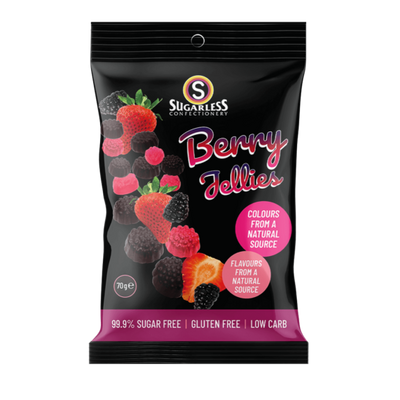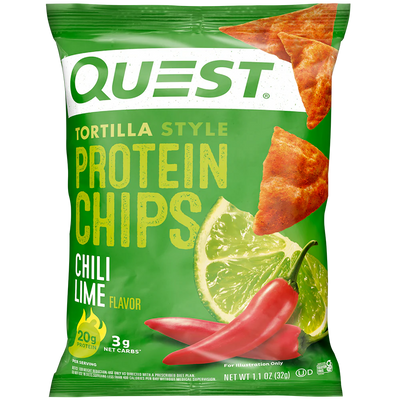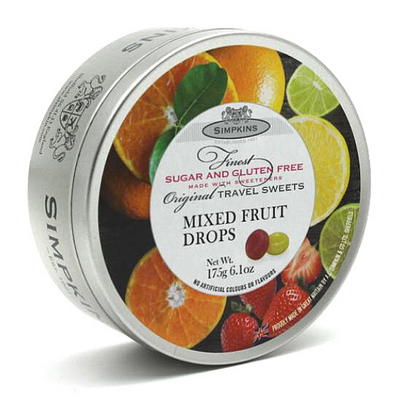Is Sugar Free Candy, Sweets, Lollies A Real Thing?
You can bet your chewies, gummies, drops, and pastilles that sugar free candy, sweets, lollies are a real thing! We know it, because, well…. we are called My Sugar Free and we sell, amongst a lot of other things – Sugar Free Lollies. (I’m going to call them lollies from here on in.)
 |
 |
What Do They Taste Like?
Just like ‘art is in the eye of the beholder, the ‘taste of lollies, is in the mouth of the eater’. (Yep, I made that up!)
The majority of our low and sugar free lollies taste just like the real thing. Sweet and delicious. Some people can find the ones sweetened with stevia have a slightly bitter aftertaste but lots of people don’t find that at all.
What’s in Sugar free Lollies to Make them Sweet?
Alternative sweeteners in lollies that we see often are called sugar alcohols. These are neither sugar nor alcohol and include mannitol, sorbitol, isomalt and xylitol, maltitol, etc. Sugar alcohols are found naturally in many fruits and vegetables but are commercially produced from carbohydrates like glucose, sucrose, and starch.
 |
 |
Sugar alcohols can lower the total carbohydrate content of foods yet still have a sweet taste. Sugar alcohols do contain energy (between 32-64kJ compared to sugar at 70kJ per teaspoon) but they are absorbed more slowly and have less, little or no effect on blood glucose levels compared to sugar (depending on which sugar alcohol it is). NB – it’s important for diabetics or those following a strict calorie-controlled diet to do their research on sweeteners and read labels carefully as these levels do vary.
Other sweeteners may include stevia, acesulphame potassium, aspartame, polyglycitol syrup, or sucralose.
Are there any Health Issues with Alternative Sweeteners that I should be aware of when Eating
Sugar free Candy, Sweets,… lollies?
When consuming sugar alcohols – some people may experience digestive issues such as gas, bloating, laxative effect – similar to eating too much fruit. These effects are not lasting nor have any long-term harmful effects. The key here is to know your limit. I personally do experience some of these symptoms after I’ve had a little bit too much maltitol. And I have to say that this has been the absolute best way for me to enjoy the occasional sweet treat but not pop more in my mouth than should or need to.
People who have phenylketonuria (PKU) should avoid aspartame due to their inability to metabolise phenylalanine. Also, those with or tardive dyskinesia should avoid it.
Acesulphame potassium got a bad rep from testing and research in the ’70s. However, the testing validity was called into question over the years. The jury is still out – and it’s a big jury with the FDA, EU CPA, CSPI, EFSA, and others not quite agreeing on how safe it is. This is one you might have to do your own research on to see where you think it fits on the safety spectrum.
Sucralose is considered safe in small amounts except for those with PKU and best not used in baking.
Stevia/Steviol glycosides still have research to be done on it, but to date, it appears to have very few side effects and a 2012 study found in Pubmed Central has shown links to suggest it may help fight or prevent some cancers.
Are Sugar Free Lollies Bad for your Teeth?
Interestingly and surprisingly most often not at all. In fact, most sugar alcohols do not cause tooth decay because they are non-cariogenic – meaning that they are not metabolised by oral bacteria which break down sugars and starches to release acids that may lead to cavities or the erosion of tooth enamel.
 |
 |
So What About Eating Lollies with Sugar?
Diabetes NZ says: “Sweet foods such as…., lollies….. will raise your blood glucose levels”.
The Heart Foundation of New Zealand tells us that:
“Eating or drinking too much sugar can contribute to increased body weight and may lead to high cholesterol and triglycerides, and type 2 diabetes”
The Healthy Food Guide also has a whole heap more information on what happens to our bodies when we eat sugar which is an easy read. (https://www.healthyfood.com/advice/sugar-and-your-body/)
And I’m pretty sure we all know about how bad sugar is for the health of our teeth.
The Bottom Line (meaning – my personal opinion).
I’m not going to lie and it’s not rocket science that we should be eating a diet that contains (as much as is possible) nutritious, whole, unprocessed foods and keep snacking and treats to a minimum. But we are all human with an inborn desire to eat sweet. And if a lolly lover from way back has the choice between lollies with sugar and those that are sugar free, well I know what I’d choose!
Sources:
- https://www.healthnavigator.org.nz
- https://www.healthline.com/
- https://www.medicalnewstoday.com/
- https://efsa.onlinelibrary.wiley.com/
- https://www.diabetes.org.nz/
- https://www.diabetes.co.uk/
See also: http://www.sugar-and-sweetener-guide.com/all-sweetener-list.html








Leave a comment